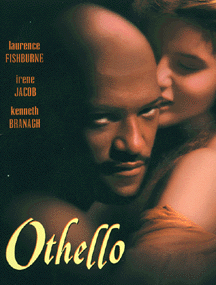

[ Metro | Metroactive Central | Archives]
Wondrous Pitiful
 Photo by Rolf Konow Choose Your Counsel Wisely: Laurence Fishburne (left) and Kenneth Branagh in "Othello" Branagh upstages Fishburne By Richard von Busack You don't know whether to commend Laurence Fishburne's bravery or wince at his foolhardiness. Fishburne is the first African American to play Othello on screen, which is worth noting, but ultimately irrelevant. What if the breakthrough actor had been Emmanuel "Webster" Lewis? (I'm saying this remembering the recent stupid comments about Denzel Washington being the wrong race to play a prince in Much Ado About Nothing. If ever aristocracy walked this earth ... ) Fishburne must have made a colossal effort. He's learned how to roll his "r"'s, and he delivers the fail-safe death scene credibly. Still, even in this skeleton version (director Oliver Parker threw out the lion's share of the text), his lines are demotic, painful--when he modestly says, "Rude am I in my speech," it's too true. Unfortunately, Fishburne is trying to make his mark over the memories of Orson Welles and Laurence Olivier, in two magnificent film versions; worse still, he's trying this unenviable feat at a very young age. Othello ought to be a middle-aged man's part, meant for a William Marshall or a Morgan Freeman, not only because it's one of the most difficult of all acting roles to carry off but also to make the relation of a young wife to an older man help the dynamic of fatal jealousy. As the wife in question, Irene Jacob is good-looking--"sport for Jove," as Iago calls her--but she's heavily accented; and when Fishburne and Jacob get into a clinch, there's no hope. Desdemona and Othello are betrayed doubly by Kenneth Branagh's Iago. Branagh gives the pair as thorough an upstaging as you are ever likely to see. Iago is pure evil, but when caught, his plans awry and his victims at his feet, he refuses to apologize or explain. "I hate the Moor," Iago says, and this is his only spoken reason for weaving a plot to madden his general, Othello, by casting suspicion on the general's wife, Desdemona. Branagh does manage to suggest complex psychological reasons for destroying his commander: jealousy, inverted lust, a sociopathic streak. He does so peerlessly, by making the 400-year-old text sound like tossed-off conversation. The only performer who matches Branagh is Anna Patrick as Iago's wife, Emilia, whose proto-feminist "Let them use us well" speech is almost the only Branaghless moment when you can feel your spirit respond to the poetry. Parker has kept the famous lines but interjected a romantic interlude (rose petals on the sheets--pretty!) and many extraneous monologues. As Wyndham Lewis once wrote, a fall from a cliff is more interesting than a fall from a cushion, and thus the misbegotten Othello is more than tragedy--it's near catastrophe. [ Metro | Metroactive Central | Archives ]
| ||||||||||||||||||||||||||||||
This page was designed and created by the Boulevards team.
Copyright © 1996 Metro Publishing and Virtual Valley, Inc.